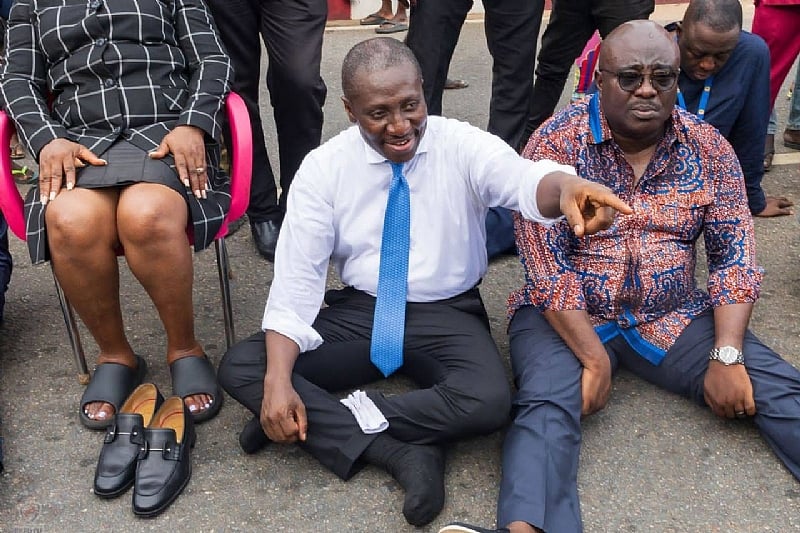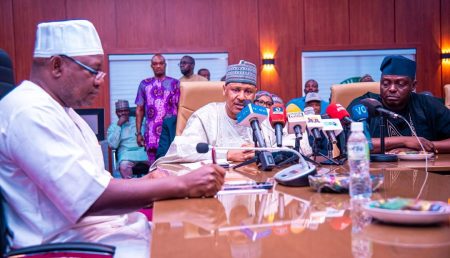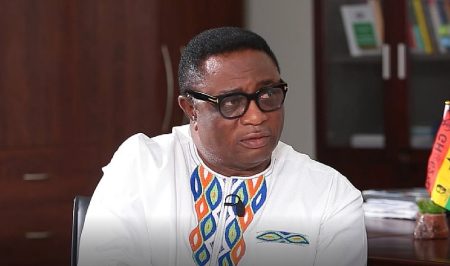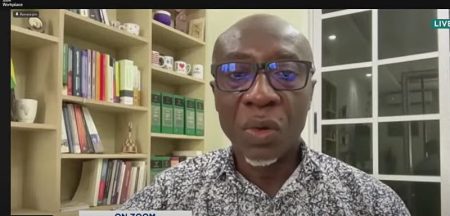The escalating tension between the New Patriotic Party (NPP) and the Economic and Organised Crime Office (EOCO) over the arrest and detention of Ashanti Regional Chairman, Bernard Antwi Boasiako, popularly known as Chairman Wontumi, has prompted a strong warning from Minority Leader Alexander Afenyo-Markin to EOCO’s Executive Director, Raymond Archer. Afenyo-Markin, during a Minority Caucus protest at EOCO headquarters, cautioned Archer against what he perceived as dismissive and obstructive behavior towards political stakeholders, emphasizing the transient nature of power and the importance of respectful engagement regardless of political affiliation. The core of the dispute, it appears, stems from EOCO’s alleged reluctance to engage in open and constructive dialogue with the NPP, leading to growing concerns of partisan bias within the organization.
Afenyo-Markin’s admonition to Archer underscored the temporary nature of leadership positions, reminding the EOCO Director that his current authority is not permanent. This pointed remark served as a broader caution against the potential abuse of power and the importance of exercising authority with fairness and respect. He criticized EOCO’s perceived evasiveness and lack of responsiveness to communication attempts by the NPP, alleging a pattern of bureaucratic stalling tactics that fueled suspicions of politically motivated actions against Chairman Wontumi. The Minority Leader’s frustration was palpable as he described the alleged run-around tactics employed by EOCO, further exacerbating the already tense situation and deepening mistrust between the two entities.
The crux of the NPP’s grievance revolves around EOCO’s handling of Chairman Wontumi’s arrest and detention. Afenyo-Markin’s statements indicate a belief that the process has lacked transparency and has been marred by a lack of proper communication. The perceived unwillingness of EOCO to engage in meaningful dialogue has only heightened these concerns, creating an environment of suspicion and distrust. This lack of communication, according to Afenyo-Markin, only serves to reinforce the perception of partisan bias, undermining the credibility and impartiality of the institution. He stressed the importance of open communication and due process, suggesting that EOCO’s actions have deviated from these fundamental principles.
Despite the escalating tensions and perceived injustices, Afenyo-Markin reaffirmed the NPP’s commitment to pursuing peaceful dialogue and seeking a resolution through legal and respectful means. He reiterated the party’s belief in the importance of engaging with EOCO and other relevant authorities constructively, despite the challenges they have faced. This commitment underscores the NPP’s desire to address the situation responsibly and avoid further escalation. While advocating for peaceful dialogue, Afenyo-Markin also drew a sharp distinction between the pursuit of justice and what he viewed as politically motivated persecution. He cautioned against using legal proceedings as a tool to target political opponents, highlighting the importance of upholding the principles of fairness and impartiality within the justice system.
The arrest and detention of Chairman Wontumi, coupled with EOCO’s alleged unresponsiveness and evasiveness, have created a climate of distrust and fueled accusations of political maneuvering. Afenyo-Markin’s public admonishment of Raymond Archer serves as a clear message that the NPP will not tolerate what it perceives as partisan actions against its members. His emphasis on the transient nature of power serves as a reminder that accountability and fairness are essential, even in the exercise of authority. The Minority Leader’s warning underscores the delicate balance between upholding the rule of law and ensuring that legal processes are not misused for political purposes.
Ultimately, the standoff between the NPP and EOCO highlights the critical need for transparent and accountable governance. Afenyo-Markin’s call for open dialogue and his caution against politically motivated persecution underscore the importance of upholding democratic principles and ensuring that justice is administered fairly and impartially. The situation calls for a de-escalation of tensions and a commitment to constructive engagement between all parties involved. The resolution of this dispute will require a concerted effort to rebuild trust and address the underlying concerns of partisan bias that have fueled the current conflict. The future relationship between the NPP and EOCO hinges on the ability of both parties to engage in respectful dialogue and uphold the principles of fairness and transparency.














